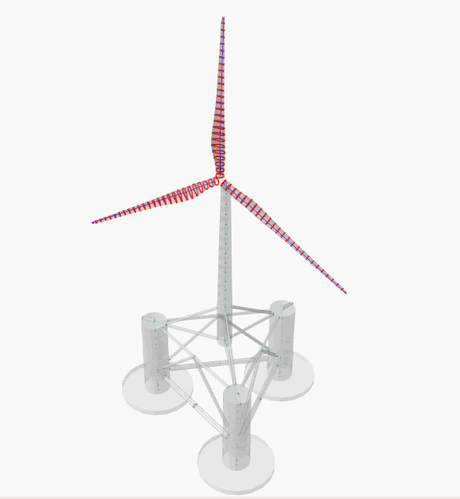Standardisation of floating wind turbines

International certification body DNV GL has launched a joint industry project (JIP), together with 13 global partners, to mutually develop a Recommended Practice for the coupled analysis of floating offshore wind turbines. Standardisation is a key milestone to guide the industry towards the development of reliable floating turbines.
“The analysis of floating wind turbines is a complex challenge that requires the integration of different technologies and disciplines,” said Luca Vita, project manager of the JIP and senior engineer at DNV GL – Energy, Renewables Certification. “The lack of a common agreement on the optimal approach to conduct these analyses during the different stages of the design process adds potential risk factors and time delays in the project development, but also in the cost evaluation of new conceptual designs.”
The Recommended Practice will build on the experience from the application of the Offshore Standard DNV-OS-J103 ‘Design of Floating Wind Turbine Structures’, which was published in 2013, and will contain methods and ways to fulfil the requirements in DNV-OS-J103. Since its publication, the offshore standard has been broadly used for the design of floating wind turbine structures; however, at the time of publication, the practical experiences in the field of floating offshore wind energy were rather limited.
Based on the latest know-how, the joint approach of developing the future Recommended Practice will reduce the risk of inadequate analysis, leading to time savings. Further advantages stem from the focus on the design of floating wind turbines and the validation of numerical models in respect to their subsequent certification. The coherent structure of the Recommended Practice also provides a unified cost structure for the project development process.
The project brings together multiple stakeholders from the wind, oil and gas, and maritime industries. The participants come from a broad range of industries, including utilities, component manufacturing, engineering consultants, maritime research institutes, shipyards and academic research.
Consulting company Ramboll is one such participant, with floating wind turbine specialist Denis Matha saying the company will “contribute to this effort by providing our knowledge and experience in the design and analysis of floating wind turbines, covering coupled simulation as well as our structural, mooring and cable expertise”.
The CEO of floating wind specialist Ideol, Paul de la Guérivière, said his company will share its years of experience, coupling multiple wind turbines with its patented floater. He said, “The Recommended Practice should strongly help the floating offshore wind industry and accelerate the development of commercial-scale floating wind farms.”
Vita concluded, “This project provides a unique platform to mutually develop an invaluable Recommended Practice which will be beneficial to each industry stakeholder, taking the wide-ranging spectrum of interdisciplinary skills and business objectives of each participant into account.”
Untapped solar could achieve billions in savings
UNSW research has found that people living in apartments, social housing and private rental...
NSW South Coast gains its first community battery
The Shell Cove battery is one of 54 batteries currently being rolled out across Endeavour's...
The sustainability sector's thoughts on a 'future made in Australia'
Hear thoughts from leaders in heavy manufacturing and climate tech, regional areas and cities as...











